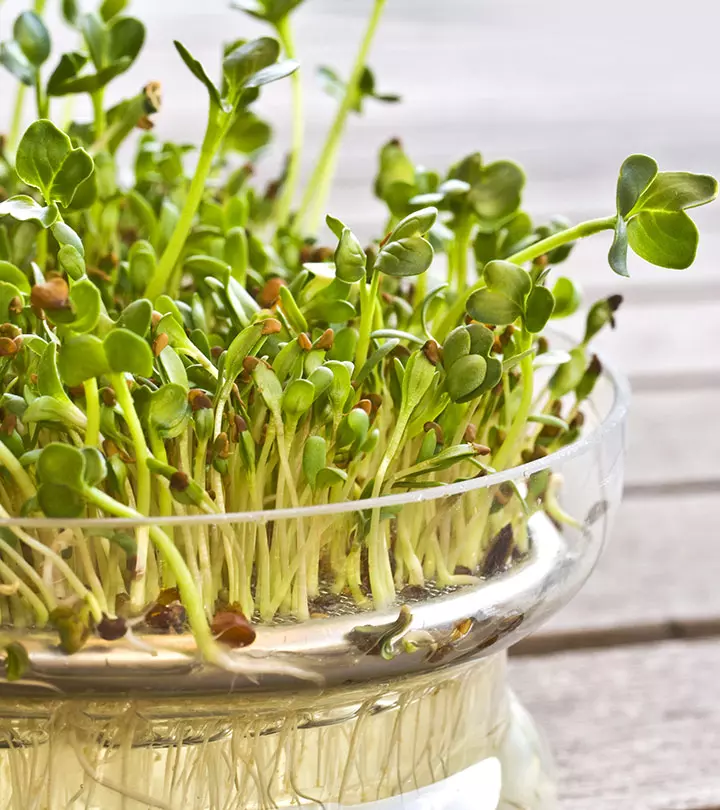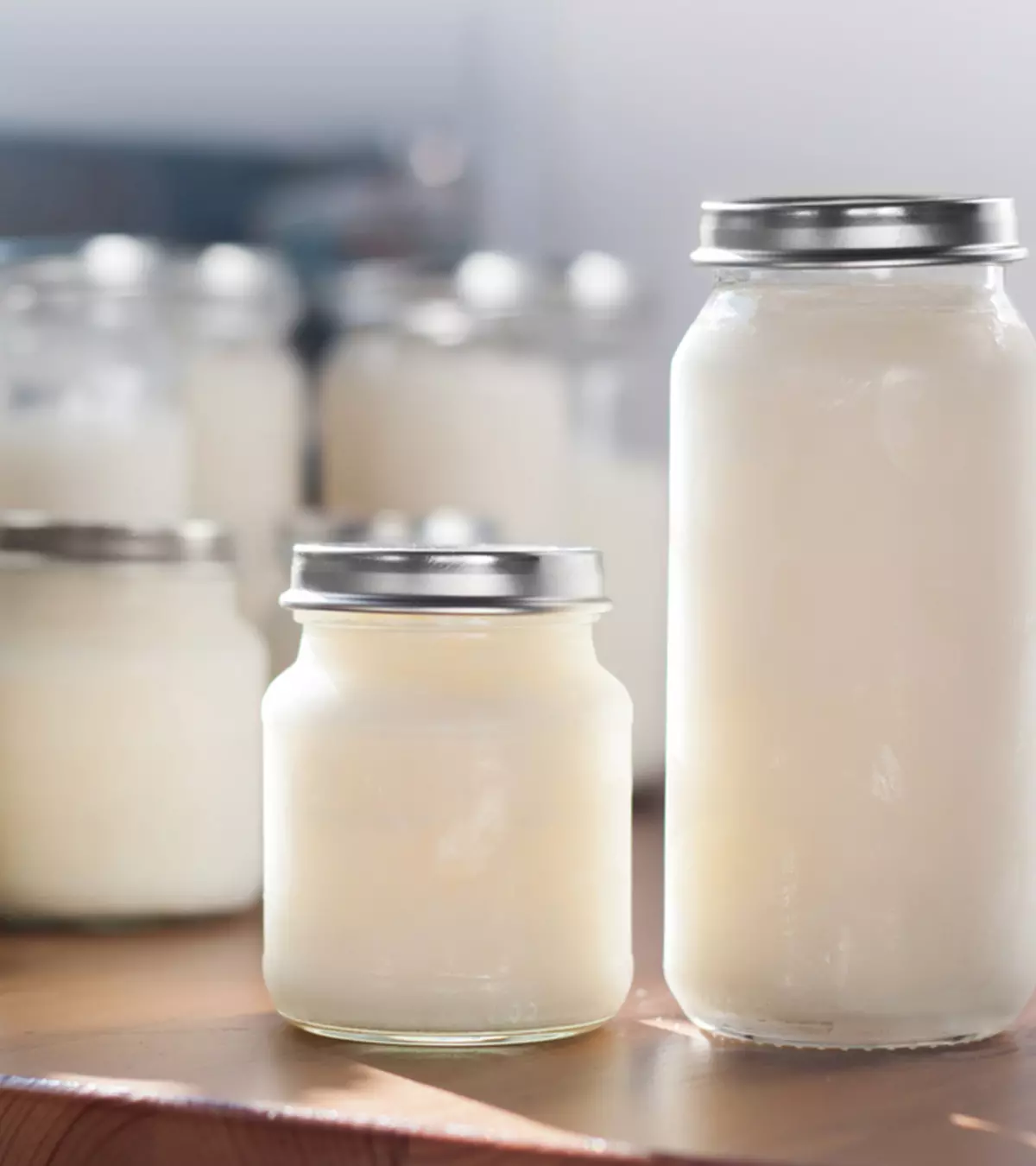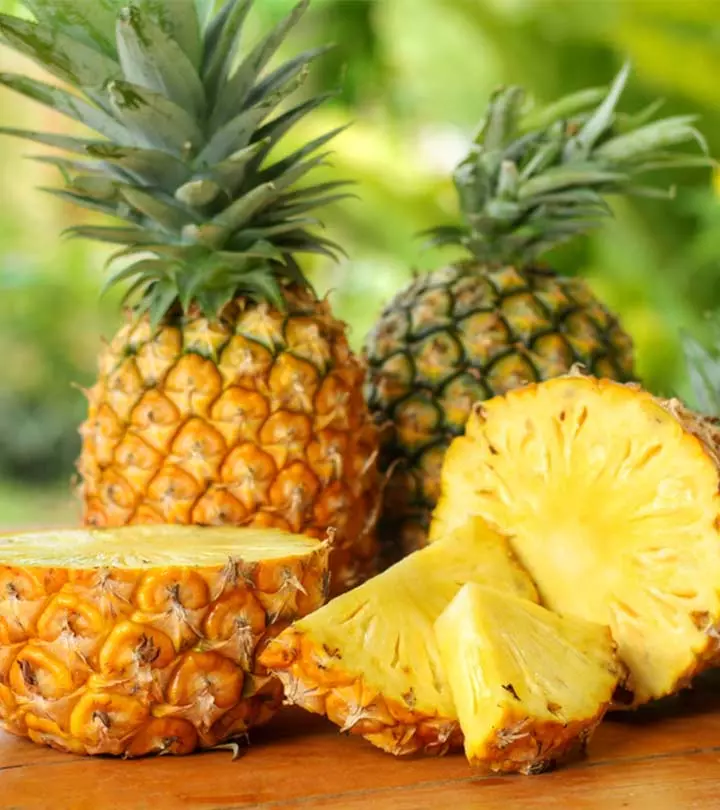
Image: Shutterstock
Lactating women may be unsure about their dietary choices because whatever they eat will be shared with their infants. One such doubt is whether or not to eat pineapple during breastfeeding.

Pineapple is a hydrating fruit that contains several essential nutrients, dietary fiber, and bioactiveiA type of chemical that can be found in trace amounts in plants and some foods components that support long-term health (1). Most of these nutrients can be passed through breast milk and could help the infant too. But pineapple is acidic and can cause diaper rash in breastfeeding babies.
This post addresses the most prevalent questions about pineapple, including its benefits for nursing mothers and ways to incorporate it into a breastfeeding diet.
Key Pointers
- Pineapple is a highly nutritious fruit with high carbohydrate and water content and is beneficial for nursing mothers.
- It provides antioxidants and gives energy.
- You can consume fresh pineapple or canned pineapple preserved in its juice or water.
Can Nursing Mothers Eat Pineapple?

Yes, pineapple is a nutritious fruit that you can consume when nursing and during motherhood.
Contrary to the popular belief, there are no research studies to corroborate the belief that breastfed babies get diaper rash due to the maternal intake of acidic fruits. Instead, it’s the babies’ consumption of acidic fruits, such as citrus fruits, which may lead to diaper rash, especially in sensitive babies (2).
Nevertheless, if you suspect any food, including pineapple, is affecting your baby, eliminate it from the diet for a few days and observe the change. If your baby shows improvement in their health, it is most likely that the food item was affecting them through breast milk.
Nutritional Value Of Pineapple
Pineapple has several varieties with varying nutritional values and is a breastfeeding-friendly fruit. On average, one cup of pineapple (165g) can offer a nursing mother the following nutrients to contribute to her nutritional needs during the lactation period and beyond (3) (4).
| Nutrients | Amount | RDA* |
|---|---|---|
| Water | 142g | – |
| Energy | 82.5kcal | – |
| Carbohydrate, by difference | 21.6g | – |
| Fiber, total dietary | 2.31g | 34g |
| Calcium, Ca | 21.4mg | 1000mg |
| Magnesium, Mg | 19.8mg | 310mg |
| Phosphorus, P | 13.2mg | 700mg |
| Potassium, K | 180mg | 2800mg (AI) |
| Vitamin C, total ascorbic acid | 78.9mg | 120mg |
| Folate, total | 29.7µg | 500mg |
Source: USFDA and Dietary Guidelines For Americans 2025-2025* RDA for lactating mothers between the ages of 19 and 30 years.AI = Adequate intake – nutrient level assumed to ensure nutritional adequacy.
 Health fact
Health factPossible Health Benefits Of Pineapple
Pineapple is known to have several medicinal and therapeutic properties. Most of these properties are attributed to bromelainiAn anti-inflammatory enzyme that helps the body fight pain and swelling , an enzyme found in the fruit and stem of pineapple (5). Here’s a brief overview of some of the benefits you could reap from eating pineapple as part of your well-balanced breastfeeding diet. Pineapple is one of the many fruits to eat while breastfeeding, and it can provide essential nutrients for both you and your baby.
- Offers hydration: 165g of pineapple gives approximately 142g of water, making pineapple a natural source of hydration. Since breastfeeding moms need good hydration to keep their breast milk production going, adding pineapple to your breastfeeding diet is a good choice (6). Besides water, pineapple also provides several micronutrients to promote postpartum recovery and benefit long-term health.
- Provides several nutrients: Pineapple contains significant amounts of vitamin C and essential nutrients, such as potassium, manganese, and folate, which could contribute to a nursing mother’s nutritional needs. Some of the nutrients, such as vitamins, can also pass to the breastfeeding baby in small quantities through breast milk (7).
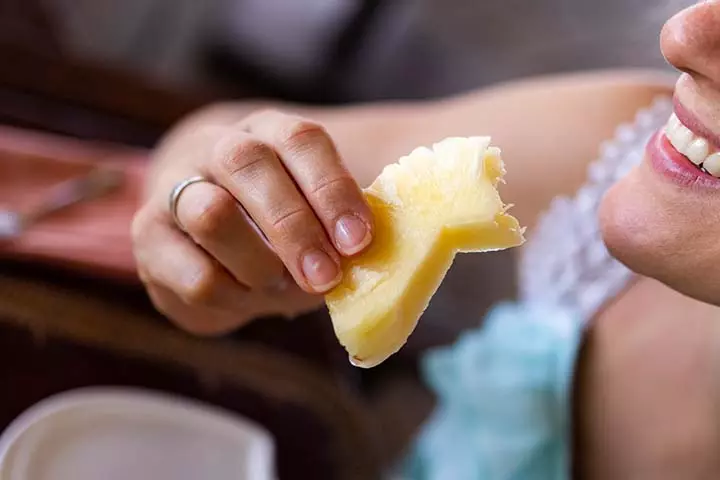
- Gives dietary fiber: A nursing mother needs about 34g of fiber daily. Pineapple being a fiber-rich food, can help meet this requirement and improves digestion. Dietary fiber is essential for adding bulk to the diet and keeping the bowel movement smooth. Since several mothers experience constipation during the postpartum period, pineapple can be a good choice for them.
- Offers antioxidants: Pineapple is rich in vitamin C, a vital vitamin that acts as an antioxidant and fights free radical damage to improve long-term health. In addition, it has bromelain, flavonoidsiA class of natural compounds found in various fruits and vegetables , and phenolic compounds, such as coumaric acid, ferulic acid, chlorogenic acid, and ellagic acid, which also confer antioxidant effects essential for robust immune system functioning (8).
Besides these benefits, pineapple is known to have anti-inflammatory, analgesiciA type of medicine used to treat pain , and antimicrobial properties. Perhaps, it’s why the use of pineapple flesh and juice is prevalent in treating ailments, such as sore throat and seasickness, in folk and traditional medicine (9).
The graph below represents the amount of bromelain present in different parts of a pineapple, such as the skin, flesh, core, crown, and stem. It shows that the skin contains the highest amount of bromelain, closely followed by the amount contained in the flesh. The amounts are seen to decrease slightly over ten days.

The concentration of bromelain in different pineapple parts
Source: Properties of bromelain extract from different parts of the pineapple variety Morris; Biocatalysts and Agricultural biology Be watchful
Be watchfulTips To Select And Store Pineapple
Proper selection and storage of pineapple are vital to ensure you reap its benefits to the fullest. Here are some simple tips you can follow while buying pineapple.
Selecting a pineapple
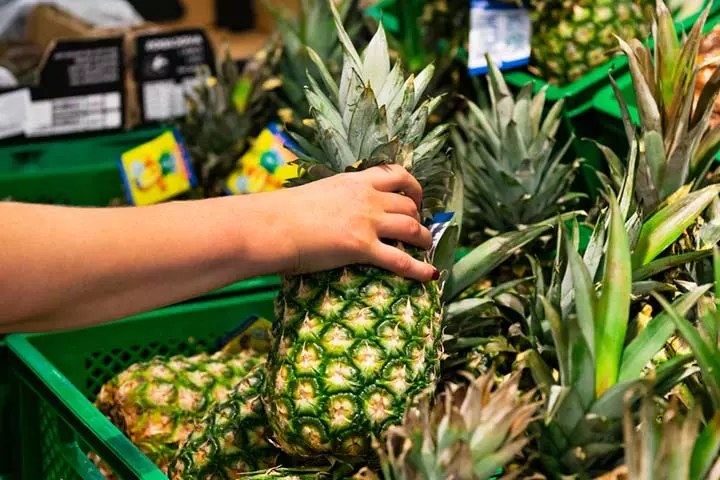
- Choose organic pineapple with dark green leaves and a greenish-yellow exterior. These attributes indicate that the pineapple is ripe, fresh, and healthy. Choosing organic pineapple also helps reduce pesticide exposure.
- Hold the pineapple in your hands and squeeze it. A ripe pineapple has a firm shell and feels soft when you squeeze it.
- Pick a pineapple that feels heavy for its size. Heavy pineapples are often juicier, sweeter, and riper.
- Sniff the base of the pineapple. A fresh and fully ripe pineapple smells sweet and pleasant.
- Discard pineapples with soft spots and bruises with the juice oozing out of them. Ensure the pineapple you pick doesn’t have any darkened eyes.
Storing a pineapple
- Once you bring pineapple home, clean with a damp cloth to remove any dust, dirt, or debris.
- Store the pineapple at the kitchen counter if you plan to consume it within two to three days. Otherwise, keep it in a perforated plastic bag and store it in the refrigerator for three to five days.
- Store cut pineapple in a glass or BPA-free airtight plastic container in the refrigerator.
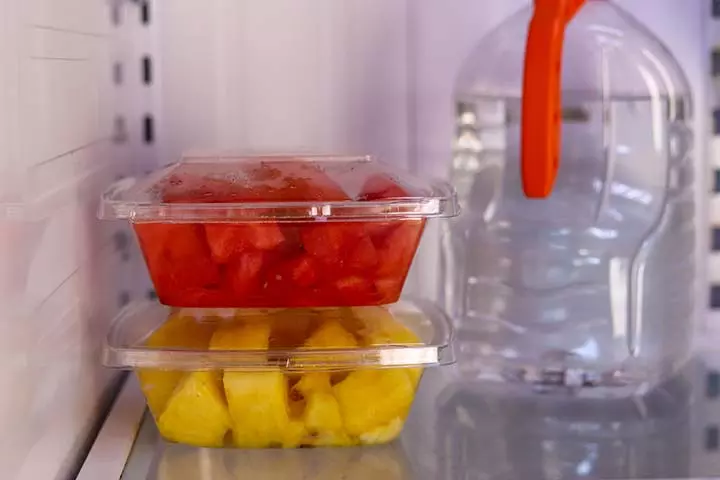
Ways To Add Pineapple To Your Breastfeeding Diet
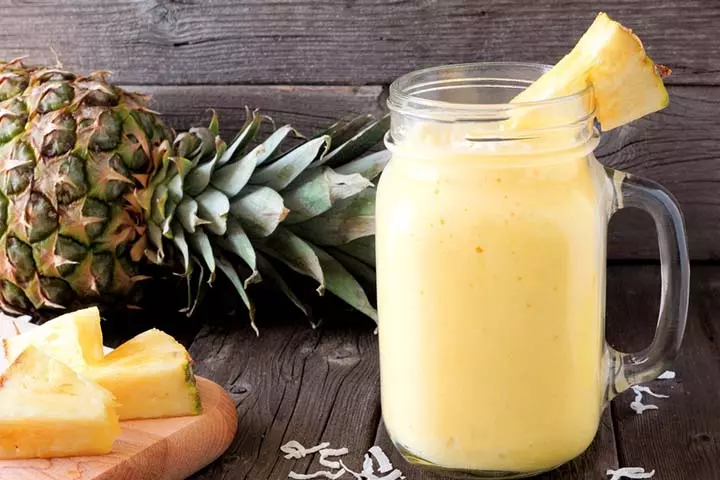
You can consume fresh or frozen pineapple in a salad or make its juice (with pulp) and use it as a base for your nutritious lactation smoothie recipes. Alternatively, you can use pineapple to tenderize tough meat cuts or enhance a sweet or savory dish’s flavor. Irrespective of your choice, remember the following points.
- Eat pineapple in moderation as a part of a well-balanced and nourishing diet.
- Use fresh pineapple as much as possible. If fresh and juicy pineapple isn’t available, you can opt for frozen pineapple.
- Use canned pineapple cautiously. Most canned fruits are preserved in sugar syrup, so they are high in calories. Therefore, look for canned pineapple preserved in its juice or water.
Frequently Asked Questions
1. Does pineapple increase breast milk?
Pineapple is made of 80 to 85% water. It is low on calories and rich in vitamin C and manganese. There is no definitive evidence that it improves milk supply, but it can be hydrating, and therefore may be a good addition to the nursing mother’s diet (1) (10). You can check with your lactation consultant or nutritionist if you have any questions about the safety of pineapple during nursing.
2. Is it safe to eat pineapple after the C-section?
Yes, you may eat pineapple after C-section if you have no history of previous allergies or discomforts. However, if necessary, you may seek guidance from your lactation consultant or nutritionist.
3. If I eat pineapple, will it make my baby gassy?
Consumption of acidic fruits, such as pineapple, citrus fruits, and tomatoes, may cause gas in mothers. However, it is unlikely to affect the baby because the gas does not pass to the baby from the breast milk (11).
4. Can my baby fall sick if I eat pineapples?
There is no evidence to suggest that consuming pineapple while breastfeeding will make a breastfeeding baby sick. In fact, including pineapple in your daily diet can provide various benefits to you and your nursing infant. However, if unsure, you could try out pineapples and observe your baby for a few days. If your baby shows any reaction, speak to your doctor and remove pineapple from your diet.
5. Does pineapple consumption impact the taste of breast milk?
According to Lisa Richards, nutritionist and the founder of Candida Diet, “While there is no concrete evidence that moderate pineapple consumption significantly changes breast milk composition, some breastfeeding mothers report that eating pineapple or other acidic fruits affects the taste or odor of their milk.”
Pineapple is a tropical fruit that lactating mothers may add to their diet. You can eat pineapple raw, added to a salad, as a meat tenderizer, or for making a sweet-tangy tropical mocktail or smoothie. Alternatively, you can add pineapple to sweet and savory dishes for enhanced flavor and nutritional value. Pineapple during breastfeeding helps supply various vitamins, minerals, antioxidants, and anti-inflammatoryi A medication or substance that relieves inflammation compounds that can aid postpartum recovery and support the increased nutritional demands. If your baby manifests any discomfort, discontinue eating pineapples for a few days and track the changes.
Infographic: Pineapple Recipes For Breastfeeding Mothers
Besides being refreshing and delicious, the many nutrients of pineapple make it one of the superfoods for lactating mothers. But since breastfeeding is the phase when your routine is most hectic, these quick and easy recipes will let you include the goodness of pineapple in your diet while allowing you to dedicate enough time to your baby.
Some thing wrong with infographic shortcode. please verify shortcode syntax
Illustration: Is It Safe To Eat Pineapple During Breastfeeding?

Image: Dall·E/MomJunction Design Team
Explore the advantages of pineapple for lactating mothers in this informative video. Gain insights on including this delectable fruit into your dietary regimen as a wholesome and satisfying snack.
References
- Cindy Rosas Domínguez, et al.; (2018); Content of bioactive compounds and their contribution to antioxidant capacity during ripening of pineapple (Ananas comosus L.) cv Esmeralda
https://ojs.openagrar.de/index.php/JABFQ/article/view/7153 - Infant Nutrition and Feeding; USDA.
https://www.pregnancybirthbaby.org.au/nappy-rash - Pineapple raw all varieties; USDA.
https://fdc.nal.usda.gov/fdc-app.html#/food-details/169124/nutrients - Dietary Guidelines for Americans 2025-2025; USDA.
https://www.dietaryguidelines.gov/sites/default/files/2025-12/Dietary_Guidelines_for_Americans_2020-2025.pdf - RajendraPavan et al. Properties and Therapeutic Application of Bromelain: A Review; U.S. National Library of Medicine.
https://www.ncbi.nlm.nih.gov/pmc/articles/PMC3529416/ - Nursing Your Baby? What You Eat and Drink Matters; Academy of Nutrition and Dietetics.
https://www.eatright.org/health/pregnancy/breastfeeding-and-formula/nursing-your-baby-what-you-eat-and-drink-matters - Breastfeeding While Taking High Dose Vitamins; IABLE.
https://lacted.org/questions/breastfeeding-while-taking-high-dose-vitamins/ - Mavil May C. Cervo et al. Effects of Canned Pineapple Consumption on Nutritional Status Immunomodulation and Physical Health of Selected School Children; U.S. National Library of Medicine.
https://www.ncbi.nlm.nih.gov/pmc/articles/PMC4258310/ - Pineapple; Purdue University.
https://www.hort.purdue.edu/newcrop/morton/pineapple.html - Pineapple
https://www.fao.org/land-water/databases-and-software/crop-information/pineapple/en/ - Maternal food restrictions during breastfeeding.
https://www.ncbi.nlm.nih.gov/pmc/articles/PMC5383635/
Community Experiences
Join the conversation and become a part of our nurturing community! Share your stories, experiences, and insights to connect with fellow parents.
Read full bio of Mindy Cockeram
- Lisa Richards is a certified nutritionist coach from the Institute for Integrative Nutrition. She is an author at the Candida Diet (thecandidadiet.com), with 17 years of experience.
 Lisa Richards is a certified nutritionist coach from the Institute for Integrative Nutrition. She is an author at the Candida Diet (thecandidadiet.com), with 17 years of experience.
Lisa Richards is a certified nutritionist coach from the Institute for Integrative Nutrition. She is an author at the Candida Diet (thecandidadiet.com), with 17 years of experience.
Read full bio of Swati Patwal
Read full bio of Rohit Garoo
Read full bio of Anindita Ghatak











